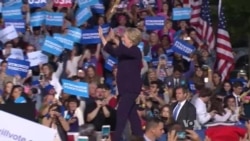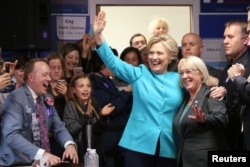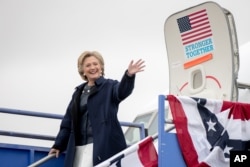The 2016 election campaign is unusual on many fronts, but one aspect of it is truly historic. For the first time, a major U.S. party nominated a woman – Democrat Hillary Clinton - as its presidential candidate.
Since the United States is at the forefront of efforts to promote women’s empowerment and advancement around the world, why has it taken so long to nominate a female presidential candidate? And how do assumptions about a woman’s role affect the public’s response to a woman candidate?
Attitudes and gender bias
Criticism is partly rooted in gender bias and sexism. Michele Swers, a Georgetown University government professor and co-author of "Women in the Club," about females in the U.S. Senate, says people associate toughness and leadership qualities with male leadership.
"A woman travels in a narrower lane," she says, "so that women in politics have to prove both that they hold masculine qualities of leadership but still also hold feminine personality traits that people assume women have.”
Clinton is often criticized for being too cold and calculating. But when she shows her softer side, so as not to seem "unwomanly," she elicits the opposite reaction, says Sonya Michel, a professor emerita at the University of Maryland.
“The more she tries to avoid those kinds of criticisms, people say, ‘Well is she strong enough? Is she firm enough?’ You know, how could she operate on a world stage?”
The role of the political system
The factors that have denied a woman this milestone so far in the United States are varied and complex, and they relate to how the political system operates in the United States.
“When it comes to presidential nominations," Swers says, "you need to not just work your way up through the party, but you need to build your own coalition, your own coalition of donors, your own coalition of connections to various state party leaders. And all these things have been dominated by men over time, so it’s harder for a woman to have those connections and to break in."
That’s probably why the first woman to get so close to the presidency is one who has developed those connections as former first lady, former senator and former secretary of state.
"In Europe, especially in the countries that have parliamentary systems, it’s really [that] people vote for the party. They don’t necessarily vote for the candidate; they don’t vote for the person who is going to become prime minister," says Michel, who has focused her research on the history of women and gender.
She cites, as examples, Margaret Thatcher and Theresa May in Britain and Angela Merkel in Germany.
Women candidates face double standards even in countries that have had female leaders.
“People just have this image that they are so tough, [which is] unfair, and it’s just because they are in a position of power," says Dori Toribio, a Washington correspondent for the Spanish broadcasting group Mediaset.
Double standard versus legitimate criticism
Swers cautions that the criticism leveled at Clinton isn't only because of gender bias.
"I think the criticisms related to the email servers and the campaign donations to the Clinton Foundation are legitimate in that they question values that we hold about transparency, about honesty, about character in our leadership," she says, noting previous candidates have faced similar concerns.
However, Swers adds, it’s easy for those questions to seep into gender bias, because women candidates are supposed to be more honest, more trustworthy, more likable.
And more prepared, says Toribio. "That’s the thing with women in politics. You have to be older, you have to be tougher and in my point of view you have to be 10 times better than a man so that you can get to that point. You have to prove yourself all the time.”
Reasons for the different reactions toward Clinton are varied and reflect the fact that the country is diverse and differentiated. On November 9, the world will know whether U.S. voters have chosen a female president, shattering the highest of glass ceilings.







